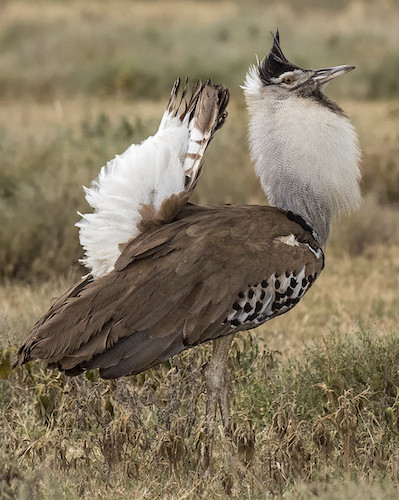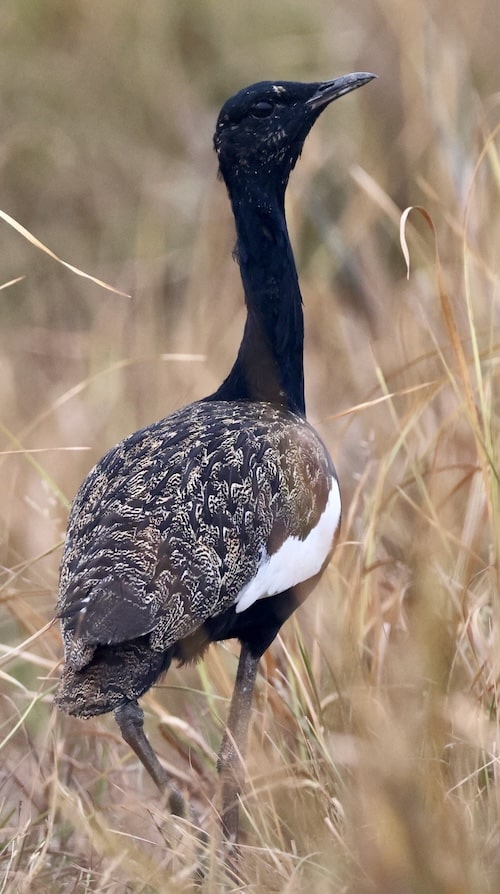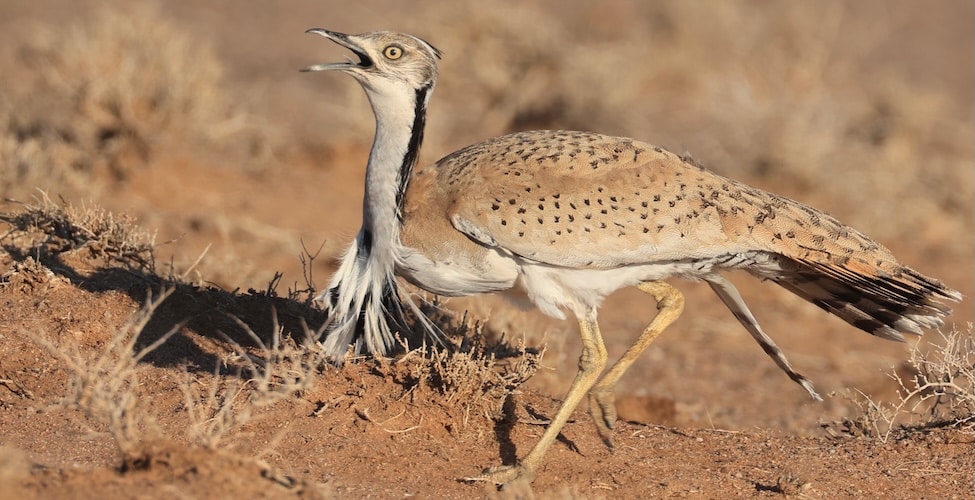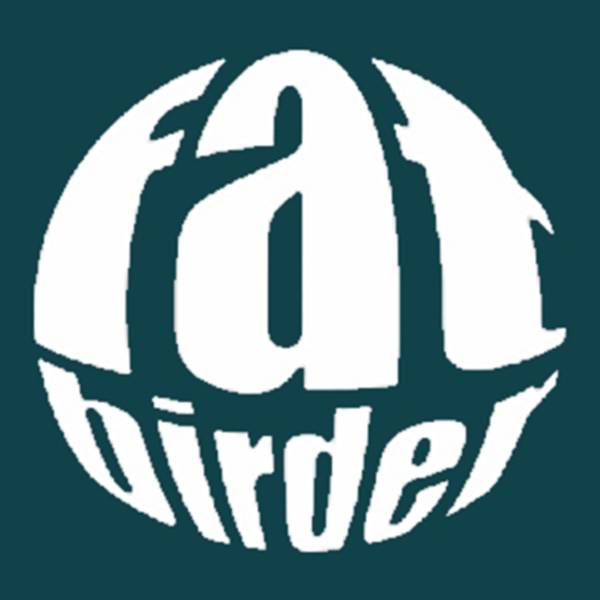Otididae – Bustards, Floricans & Korhaans

The Otididae are the sole family in the order Otidiformes. It includes bustards, floricans and korhaans. (Two of the Indian bustards are called floricans and some Southern African species are known as Korhaans). They are large, terrestrial birds living mainly in dry grassland areas and on the steppes of the Old-World. They range in length from 40cm to 150cm. They are omnivorous and opportunistic, eating leaves, buds, seeds, fruit, small vertebrates, and invertebrates.
They are all fairly large birds with the two largest species (Kori Bustard Ardeotis kori and Great Bustard Otis tarda) being frequently cited as the world’s heaviest flying birds. In both of the largest species, large males can exceed a weight of 20kg. They weigh around 13.5 kg on average and can attain a total length of 150cm. The smallest species is the Little Brown Bustard Heterotetrax humilis, which averages 40cm in length and around 600g in weight.
In most bustards, males are substantially larger than females, often about 30% longer and sometimes more than twice the weight. They are among the most sexually dimorphic groups of birds. In only the floricans is the sexual dimorphism reversed, with the adult female being slightly larger and heavier than the male.

Bengal Florican Houbaropsis bengalensis – ©Bird-Photo-Tours ASIA
Their wings have 10 primaries and 16–24 secondary feathers and there are 18–20 feathers in the tail. The plumage is predominantly cryptic.
Bustards are omnivorous, feeding principally on seeds and invertebrates. They make their nests on the ground, making their eggs and offspring often very vulnerable to predation. They walk steadily on strong legs and big toes, pecking for food as they go. Most prefering to run or walk over flying. They have long broad wings with ‘fingered’ wingtips, and striking patterns in flight. Many have interesting mating displays, such as inflating throat sacs or elevating elaborate feathered crests. The female lays three to five dark, speckled eggs in a scrape in the ground, and incubates them alone.
Bustards are gregarious outside the breeding season, but are very wary and difficult to approach in the open habitats they prefer.

MacQueen’s Bustard Chlamydotis macqueenii – ©Bird-Photo-Tours ASIA
Ranging in size a small chicken to a large turkey, all have an alert walking gait and they will freeze, crouching when danger approaches relying on their camouflaged plumage to avoid detection. Sadly, most species are declining or endangered through habitat loss and hunting, even where they are nominally protected.
-
Number of bird species: 26
(As at July 2025)
According to the IOC and other authorities there are 26 extant species of Bustards, Korhaans and Floricans in the family Otididae; they are:
Great Bustard Otis tarda
Arabian Bustard Ardeotis arabs
Kori Bustard Ardeotis kori
Great Indian Bustard Ardeotis nigriceps
Australian Bustard Ardeotis australis
Macqueen’s Bustard Chlamydotis macqueenii
Houbara Bustard Chlamydotis undulata
Ludwig’s Bustard Neotis ludwigii
Denham’s Bustard Neotis denhami
Heuglin’s Bustard Neotis heuglinii
Nubian Bustard Neotis nuba
Blue Korhaan Eupodotis caerulescens
White-bellied Bustard Eupodotis senegalensis
Karoo Korhaan Heterotetrax vigorsii
Rüppell’s Korhaan Heterotetrax rueppelii
Little Brown Bustard Heterotetrax humilis
Savile’s Bustard Lophotis savilei
Buff-crested Bustard Lophotis gindiana
Red-crested Korhaan Lophotis ruficrista
Southern Black Korhaan Afrotis afra
Northern Black Korhaan Afrotis afraoides
Hartlaub’s Bustard Lissotis hartlaubii
Black-bellied Bustard Lissotis melanogaster
Bengal Florican Houbaropsis bengalensis
Lesser Florican Sypheotides indicus
Little Bustard Tetrax tetrax
-
Conservation Strategy and Action Plan for the Great Bustard (Otis tarda) in Morocco
Scientific PaperIUCN, International Union for Conservation of Nature, helps the world find pragmatic solutions to our most pressing environment and development challenges. -
Eurasian Bustard Alliance (EBA)
WebsiteEurasian Bustard Alliance (EBA) is a collaborative group that brings together scientists and conservation actors to advance the conservation of bustard species in north Eurasia, broadly defined from the Caspian Sea to Korea. We investigate the ecology of bustards, develop conservation policy, and promote the sustainable use of the steppe landscapes upon which bustards depend. We launched our first programs in Kazakhstan and Mongolia in 2006 focused on the Great Bustard... -
Great Bustard Group
WebsiteThe Great Bustard Project - re-introduction into the UK -
IUCN SSC Bustard Specialist Group
WebpageWith over half of species at conservation risk, the bustard family (Otididae) is one of the most threatened families of birds. Bustards face a variety of anthropogenic threats, including poisoning...
-
Australian Bustard
| By Mark Ziembicki | 2010 | CSIRO | Paperback | 102 pages, Col & b/w figs, tabs | Out of Print | ISBN: 9780643096110 Buy this book from NHBS.com -
Great Indian Bustard
| A Pictorial Life History | By Asad R Rahmani, Devesh Gadhavi & Kedar Gore | 2016 | The Corbett Foundation | 116 pages, colour photos | ISBN: #235182 Buy this book from NHBS.com -
Little Bustard Ecology and Conservation
| Edited by Vincent Bretagnolle, Juan Traba & Manuel B Morales | 2023 | Springer Nature | Paperback | 313 pages, 20 colour illustrationsand photos, 40 b/w illustrations, tables | ISBN: 9783030849047 Buy this book from NHBS.com -
Propagation of the Houbara Bustard
| By Michel Saint Jalme & Yolanda Van Heezik | Kegan Paul International | 1996 | Hardback | 110 pages, Col & b/w plates, figs, tabs | ISBN: 9780710305183 Buy this book from NHBS.com
-
Otididae
InformationBustards, including floricans and korhaans, are large, terrestrial birds living mainly in dry grassland areas and in steppe regions... -
Otididae
InformationBustards are birds of open steppe grassland. All are long-legged, long-necked birds with stout bodies and a short, but powerful bill....
-
Arabian Bustard Ardeotis arabs
Species AccountA large, long-necked bustard with a small crest at the back of the head and white spots on the wing coverts. -
Arabian Bustard Ardeotis arabs
Species AccountThe Arabian bustard (Ardeotis arabs) is a species of bustard which is found across the Sahel region of Africa and south western Arabia. -
Arabian Bustard Ardeotis arabs
Species AccountSound archive and distribution map. -
Australian Bustard Ardeotis australis
Species AccountLarge mostly brown terrestrial bird with long gray neck and black crown, heavy pale legs. About half the size of an Emu. -
Australian Bustard Ardeotis australis
Species AccountThe Australian bustard (Ardeotis australis) is a large ground-dwelling bird that is common in grassland, woodland and open agricultural country... -
Australian Bustard Ardeotis australis
Species AccountSound archive and distribution map. -
Bengal Florican Houbaropsis bengalensis
Species AccountSound archive and distribution map. -
Bengal Florican Houbaropsis bengalensis
Species AccountThe Bengal florican (Houbaropsis bengalensis), also called the Bengal bustard, is a bustard species native to the Indian subcontinent, Cambodia, and Vietnam... -
Bengal Florican Houbaropsis bengalensis
Species AccountRapidly declining dainty bustard of tall grassland. Male is black with a speckled brown back and white wings, while female is intricately patterned in buff... -
Black-bellied Bustard Eupodotis melanogaster
Species AccountThe black-bellied bustard (Lissotis melanogaster), also known as the black-bellied korhaan, is an African ground-dwelling bird in the bustard family. Some authorities[1] place it in the genus Eupodotis. -
Black-bellied Bustard Lissotis melanogaster
BirdLife Species AccountBirdLife species profile… -
Blue Korhaan Eupodotis caerulescens
Species AccountA medium-sized bustard with striking bluish-gray underparts and neck, and dull chestnut back. The male has a black-and-white face. -
Blue Korhaan Eupodotis caerulescens
Species AccountThe blue korhaan or blue bustard (Eupodotis caerulescens) is a species of bird in the family Otididae which is native to South Africa. -
Blue Korhaan Eupodotis caerulescens
Species AccountSound archive and distribution map. -
Buff-crested Bustard Lophotis gindiana
Species AccountA fairly small bustard of thick brush in dry country. The male has a buff crest that is usually hidden, and both sexes have a black belly. -
Buff-crested Bustard Lophotis gindiana
Species AccountThe buff-crested bustard (Lophotis gindiana) is a medium-sized bird of East Africa; Somalia, Ethiopia, Kenya belonging to the family Otididae. -
Buff-crested Bustard Lophotis gindiana
Species AccountSound archive and distribution map. -
Denham's Bustard Neotis denhami
Species AccountSound archive and distribution map. -
Denham's Bustard Neotis denhami
Species AccountDenham's bustard, Stanley bustard or Stanley's bustard (Neotis denhami) is a large bird in the bustard family. -
Denham's Bustard Neotis denhami
Species AccountA large-to-medium-sized bustard with a chestnut nape and hind neck, and pale gray fore neck. -
Great Bustard Otis tarda
Species AccountThe great bustard (Otis tarda) is a bird in the bustard family, the only member of the genus Otis. It breeds in open grassland and farmland in southern and central Europe, and across temperate Asia. -
Great Bustard Otis tarda
IUCN Species Status -
Great Bustard Otis tarda
Species AccountSound archive and distribution map. -
Great Indian Bustard Ardeotis nigriceps
Species AccountImmense and stately ground-dwelling bird of expansive grasslands; also found more infrequently in other open grassy habitats such as semi-desert... -
Great Indian Bustard Ardeotis nigriceps
Species AccountThe great Indian bustard (Ardeotis nigriceps) or Indian bustard is a bustard occurring on the Indian subcontinent. -
Great Indian Bustard Ardeotis nigriceps
Species AccountSound archive and distribution map. -
Hartlaub's Bustard Lissotis hartlaubii
Species AccountSound archive and distribution map. -
Hartlaub's Bustard Lissotis hartlaubii
Species AccountHartlaub's bustard (Lissotis hartlaubii) is a species of bird in the family Otididae. It is a medium-sized bustard with a long, think neck, and long legs. -
Hartlaub's Bustard Lissotis hartlaubii
Species AccountA medium-sized, long-legged, long-necked bustard. The male has a striking black face pattern and a black line down the neck that connects to the black belly... -
Heuglin's Bustard Neotis heuglinii
Species AccounteBird https://ebird.org › species › heubus1 A fairly large and lanky bustard. Males have a mostly black face, females a striped face -
Heuglin's Bustard Neotis heuglinii
Species AccountHeuglin's bustard (Neotis heuglinii) is a species of bird in the bustard family. -
Heuglin's Bustard Neotis heuglinii
Species AccountSound archive and distribution map. -
Houbara Bustard Chlamydotis undulata
Species AccountElegant bustard with a long neck and tail. Sandy-brown above and white below with a white crest and pale eyes. -
Houbara Bustard Chlamydotis undulata
Species AccountThe African houbara (Chlamydotis undulata), also known as the houbara bustard is a relatively small bustard native to North Africa... -
Houbara Bustard Chlamydotis undulata
Species AccountSound archive and distribution map. -
Karoo Korhaan Heterotetrax vigorsii
Species AccountA medium-sized, drab, gray-brown bustard with a plain face and black throat patch. Creamy wing patches are displayed in flight. -
Karoo Korhaan Heterotetrax vigorsii
Species AccountThe karoo korhaan is a small bustard, 60 cm (24 in). Males are larger and heavier, weighing 1,600 g (56 oz) compared to the female's 1,350 g (48 oz). The head, neck and breast of the nominate subspecies is grey-brown, with a black chin and throat edged in white. -
Karoo Korhaan Heterotetrax vigorsii
Species AccountSound archive and distribution map. -
Kori Bustard Ardeotis kori
Species AccountSound archive and distribution map. -
Kori Bustard Ardeotis kori
Species AccountThe kori bustard (Ardeotis kori) is the largest flying bird native to Africa. It is a member of the bustard family, which all belong to the order Gruiformes and are restricted in distribution to the Old World. It is one of the four species (ranging from Africa to India to Australia) in the large-bodied Ardeotis genus. In fact, the male kori bustard may be the heaviest living animal capable of flight. -
Kori Bustard Ardeotis kori
BirdLife Species AccountBirdLife species account… -
Kori Bustard Ardeotis kori
IUCN Species Status -
Lesser Florican Sypheotides indicus
Species AccountLesser Florican Sypheotides indicus Small and gracile bustard of grasslands, scrubby fields, and select agricultural matrices -
Lesser Florican Sypheotides indicus
Species AccountThe Lesser Florican (Sypheotides indicus) is a small bustard species endemic to the Indian subcontinent, specifically found in tall grasslands and scrubby fields. -
Lesser Florican Sypheotides indicus
Species AccountSound archive and distribution map. -
Little Brown Bustard Heterotetrax humilis
Species AccountA small and relatively short-necked bustard. The male has a black-and-gray pattern on the head, while the female is plainer, but with abundant white... -
Little Brown Bustard Heterotetrax humilis
Species AccountThe little brown bustard (Heterotetrax humilis) is a species of bird in the family Otididae. Found in Ethiopia and Somalia... -
Little Brown Bustard Heterotetrax humilis
Species AccountSound archive and distribution map. -
Little Bustard Tetrax tetrax
Species AccountSound archive and distribution map. -
Little Bustard Tetrax tetrax
Species AccountA small brownish bustard with long legs and neck. May crouch if disturbed but when flushed, explodes noisily into a grouselike flight with whirring wings. -
Little Bustard Tetrax tetrax
Species AccountThe little bustard (Tetrax tetrax) is a bird in the bustard family, the only member of the genus Tetrax. -
Ludwig's Bustard Neotis ludwigii
Species AccountA large-to-medium-sized bustard with a dull orangish nape and hind neck, and dark gray-brown fore neck and face. -
Ludwig's Bustard Neotis ludwigii
Species AccountLudwig's bustard (Neotis ludwigii) is a species of bird in the bustard family, and named after Baron von Ludwig. It is a medium-to-large sized species. -
Ludwig's Bustard Neotis ludwigii
Species AccountSound archive and distribution map. -
Macqueen's Bustard Chlamydotis macqueenii
Species AccountA medium-to-large bustard; significantly smaller than Great Bustard, but larger than Little Bustard. -
Macqueen's Bustard Chlamydotis macqueenii
Species AccountThe Asian houbara (Chlamydotis macqueenii), also known as MacQueen's bustard, is a large bird in the bustard family. -
Macqueen's Bustard Chlamydotis macqueenii
Species AccountSound archive and distribution map. -
Northern Black Korhaan Afrotis afraoides
Species AccountSound archive and distribution map. -
Northern Black Korhaan Afrotis afraoides
Species AccountThe northern black korhaan (Afrotis afraoides), also known as the white-quilled bustard, is a species of bird in the bustard family, Otididae. -
Northern Black Korhaan Afrotis afraoides
Species AccountThe male is a striking, medium-sized, mostly dark bustard with a bold white cheek patch and a reddish bill. -
Nubian Bustard Neotis nuba
Species AccountFairly large and lanky bustard. The face is boldly marked, with black throat and eyebrow patches and a rufous crown. These markings are fainter on females. -
Nubian Bustard Neotis nuba
Species AccountThe Nubian bustard (Neotis nuba) is a species of bird in the bustard family. This is a medium-large bustard found in the sparsely vegetated interface. -
Nubian Bustard Neotis nuba
Species AccountSound archive and distribution map. -
Red-crested Korhaan Lophotis ruficrista
Species AccountA medium-sized, black-bellied bustard with diagnostic white chevrons on a brown-and-black mottled back. -
Red-crested Korhaan Lophotis ruficrista
Species AccountThe red-crested korhaan or red-crested bustard (Lophotis ruficrista) is a species of bird in the family Otididae. -
Red-crested Korhaan Lophotis ruficrista
Species AccountSound archive and distribution map. -
Rüppell's Korhaan Heterotetrax rueppelii
Species AccountSound archive and distribution map. -
Rüppell's Korhaan Heterotetrax rueppelii
Species AccountRüppell's korhaan (Heterotetrax rueppelii), also known as Rüppell's bustard, is a species of bird in the family Otididae. -
Rüppell's Korhaan Heterotetrax rueppelii
Species AccountRüppell's Korhaan, also known as Rüppell's bustard, is a species of bird in the family Otididae. -
Savile's Bustard Lophotis savilei
Species AccountSavile's Bustard, scientifically known as Lophotis savilei, is a small bustard found in dry savanna and thornscrub habitats across parts of Africa. -
Savile's Bustard Lophotis savilei
Species AccountSavile's bustard (Lophotis savilei) is a species of bird in the family Otididae. -
Savile's Bustard Lophotis savilei
Species AccountSound archive and distribution map. -
Southern Black Korhaan Afrotis afra
Species AccountA striking, medium-sized, mostly dark bustard with a bold white cheek patch and a reddish bill. The female has a black belly and is elsewhere finely barred. -
Southern Black Korhaan Afrotis afra
Species AccountThe southern black korhaan (Afrotis afra), also known as the black bustard, is a species of bird in the bustard family, Otididae. -
Southern Black Korhaan Afrotis afra
Species AccountSound archive and distribution map. -
White-bellied Bustard Eupodotis senegalensis
Species AccountA small, tawny-backed bustard with a reddish base to the bill and a strongly demarcated white belly. The male has a blue-gray neck and dark facial markings. -
White-bellied Bustard Eupodotis senegalensis
Species AccountThe white-bellied bustard or white-bellied korhaan (Eupodotis senegalensis) is an African species of bustard. It is widespread in sub-Saharan Africa. -
White-bellied Bustard Eupodotis senegalensis
Species AccountSound archive and distribution map.
